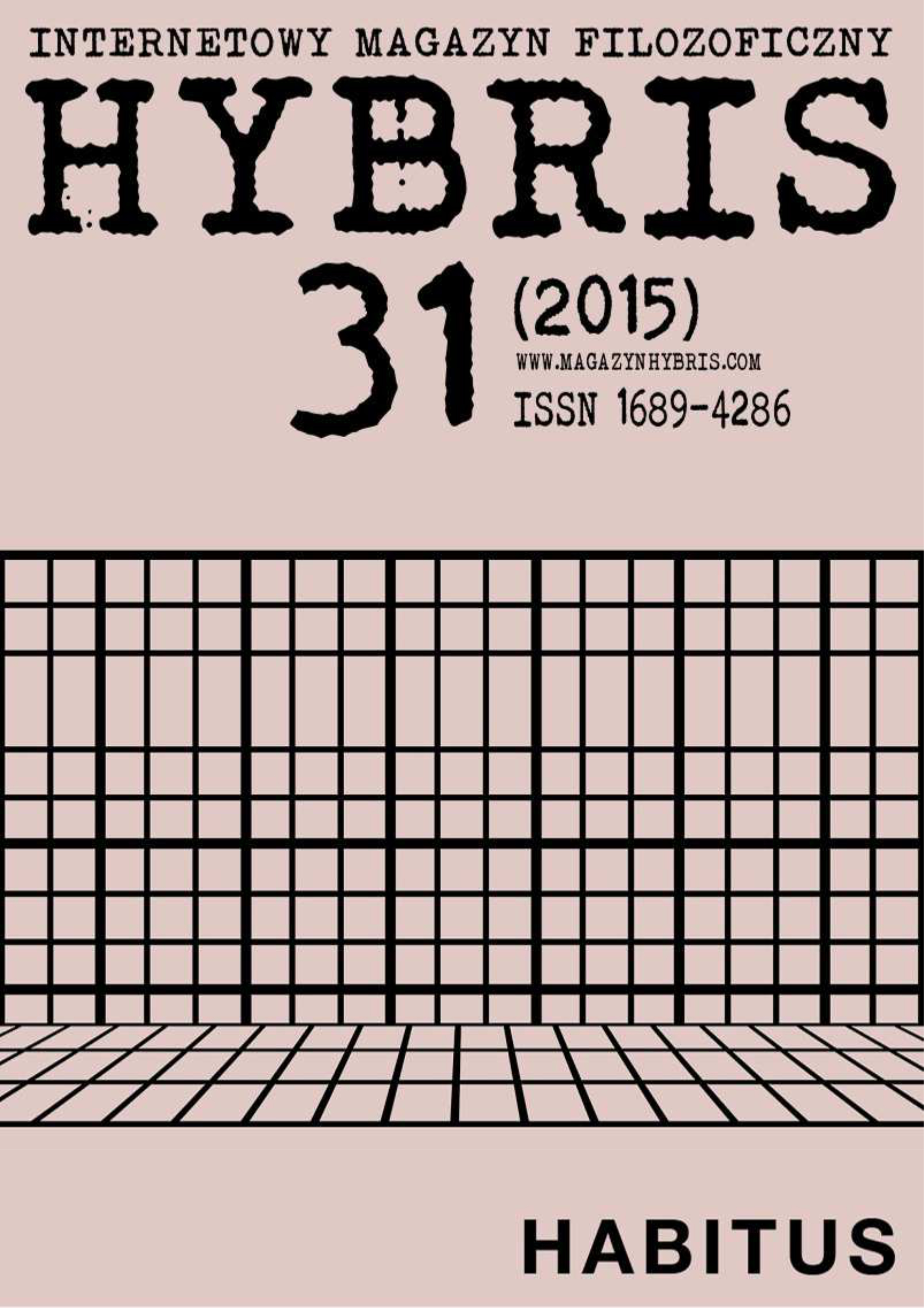Epistemic function of habitualities: elements of phenomenology of fallible cognition
DOI:
https://doi.org/10.18778/1689-4286.31.05Keywords:
habituality, fallible knowledge, situatedness, horizon, HusserlAbstract
The article analyses the phenomenon of fallible knowledge as knowledge constituted in inadequate way of givenness. The key concept in this context is habituality, i.e., passive structure of consciousness that co-constitutes the object of cognition. It is argued that habitual moment of consciousness contextualizes cognition of unknown objects by presenting them as typical for a subject in a certain cognitive relation. One can describe this phenomenon by referring to the broad notion of horizon. As the author claims, phenomenology of fallible knowledge presents human cognition as defined by horizons, so as essentially “open.” The descriptions enables one to understand phenomena of cognitive situatedness of a subject and of embodied exploration of the world by the lived body.
References
Bernet, Rudolf i Iso Kern, Eduard Marbach, 1996, Edmund Husserl. Darstellung seines Denkens, Hamburg: Felix Meiner Verlag.
View in Google Scholar
DOI: https://doi.org/10.28937/978-3-7873-2906-9
Drummond, John J., 2008, Historical Dictionary of Husserl’s Philosophy, Lanham (MD): Scarecrow Press.
View in Google Scholar
Heffernan, George, 2009, On Husserl’s Remark that „[s]elbst eine sich als apodiktisch ausgebende Evidenz kann sich als Täuschung enthüllen…” (XVII 164:32–33): Does the Phenomenological Method Yield Any Epistemic Infallibility?, „Husserl Studies”, 25, ss. 15-43.
View in Google Scholar
DOI: https://doi.org/10.1007/s10743-008-9051-5
Hopp, Walter, 2009, Phenomenology and Fallibility, „Husserl Studies”, 25, ss. 1-14.
View in Google Scholar
DOI: https://doi.org/10.1007/s10743-008-9053-3
Husserl, Edmund, 1966, Analysen zur passiven Synthesis. Aus Vorlesungs- und Forschungsmanuskripten 1918-1926, Den Haag: Martinus Nijhoff.
View in Google Scholar
Husserl, Edmund, 1967, Idee czystej fenomenologii i fenomenologicznej filozofii, przeł. D. Gierulanka, Warszawa: Państwowe Wydawnictwo Naukowe.
View in Google Scholar
Husserl, Edmund, 1973, Zur Phänomenologie der Intersubjektivität. Texte aus dem Nachlass. Dritter Teil: 1929-1935, Den Haag: Martinus Nijhoff.
View in Google Scholar
DOI: https://doi.org/10.1007/978-94-010-2474-7
Husserl, Edmund, 1974, Idee czystej fenomenologii i fenomenologicznej filozofii. Księga druga, przeł. D. Gierulanka, Warszawa: Państwowe Wydawnictwo Naukowe.
View in Google Scholar
Husserl, Edmund, 1982, Medytacje kartezjańskie, przeł. A. Wajs, Warszawa: Państwowe Wydawnictwo Naukowe.
View in Google Scholar
Husserl, Edmund, 1989, Wykłady z fenomenologii wewnętrznej świadomości czasu, przeł. J. Sidorek, Warszawa: Państwowe Wydawnictwo Naukowe.
View in Google Scholar
Husserl, Edmund, 1992, Filozofia jako ścisła nauka, przeł. W. Galewicz, Warszawa: Fundacja Aletheia.
View in Google Scholar
Husserl, Edmund, 2000, Badania logiczne, t. II, cz. I, Badania dotyczące fenomenologii i teorii poznania, przeł. J. Sidorek, Warszawa: Wydawnictwo Naukowe PWN.
View in Google Scholar
Husserl, Edmund, 2002, Logische Untersuchungen. Ergänzungsband. Erster Teil. Entwürfe zur Umarbeitung der VI. Untersuchung und zur Vorrede für die Neuauflage der Logischen Untersuchungen (Sommer 1913), Dordrecht, Boston (MA), London: Kluwer Academic Publishers.
View in Google Scholar
Husserl, Edmund, 2003, Einleitung in die Philosophie. Vorlesungen 1922/23, Dordrecht, Boston (MA), London: Kluwer Academic Publishers.
View in Google Scholar
Husserl, Edmund, 2008, Die Lebenswelt. Auslegungen der vorgegebenen Welt und ihrer Konstitution. Texte aus dem Nachlass (1916-1937), Dordrecht: Springer.
View in Google Scholar
Husserl, Edmund, 2013, Doświadczenie i sąd. Badania nad genealogią logiki, przeł. B. Baran, Warszawa: Fundacja Aletheia.
View in Google Scholar
Lohmar, Dieter, 2014, Types and Habits. Habits and Their Cognitive Background in Hume and Husserl, „Phenomenology and Mind”, 6, ss. 40-51.
View in Google Scholar
Merleau-Ponty, Maurice, 2001, Fenomenologia percepcji, przeł. M. Kowalska i J. Migasiński, Warszawa: Fundacja Aletheia.
View in Google Scholar
Moran, Dermot, 2011, Edmund Husserl’s Phenomenology of Habituality and Habitus, „Journal of the British Society for Phenomenology”, 42 (1), ss. 53-77.
View in Google Scholar
DOI: https://doi.org/10.1080/00071773.2011.11006731
Moran, Dermot, 2014, The ego as Substrate of Habitualities: Edmund Husserl’s Phenomenology of Habitual Self, „Phenomenology and Mind”, 6, ss. 24-39.
View in Google Scholar
Płotka, Witold, 2013, Fenomenologia między internalizmem i eksternalizmem. Sformułowanie problemu, „Studia Philosophiae Christianae”, 49 (1), ss. 71-91.
View in Google Scholar
Rinofner-Kreidl, Sonja, 2004, What is Wrong with Naturalizing Epistemology? A Phenomenologist’s Reply, [w:] Richard Feist (red.), Husserl and the Sciences: Selected Perspectives, Ottawa: University of Ottawa Press, ss. 41-68.
View in Google Scholar
Sowa, Rochus, 2014, Episodische und nicht-episodische Intentionalität. Zur konstitutiven Funktion der epistemischen Habitualitäten des Wissens und Glaubens bei Edmund Husserl, „Fenomenologia”, 12, ss. 15-48.
View in Google Scholar
Stroud, Barry, 2000, Understanding Human Knowledge. Philosophical Essays, Oxford: Oxford University Press.
View in Google Scholar
Thompson, Evan, 2010, Mind in Life: Biology, Phenomenology, and the Sciences of Mind, Cambridge (MA), London: Harvard University Press.
View in Google Scholar
Waligóra, Marcin, 2013, Wstęp do fenomenologii, Kraków: Universitas.
View in Google Scholar
Downloads
Published
How to Cite
Issue
Section
License

This work is licensed under a Creative Commons Attribution-NonCommercial-NoDerivatives 4.0 International License.






